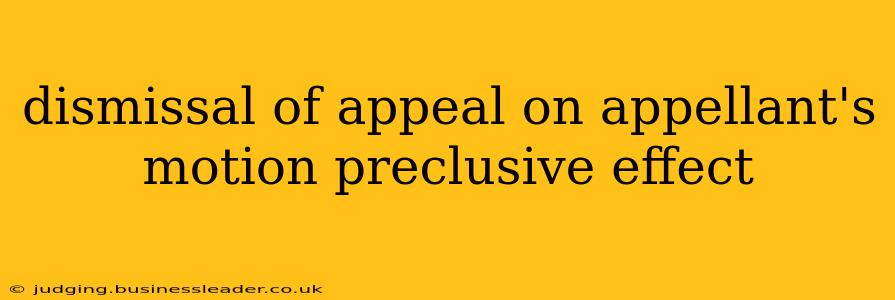The dismissal of an appeal on the appellant's motion—meaning the party who initiated the appeal requests its dismissal—can have significant preclusive effects, impacting future litigation. Understanding these effects is crucial for both appellants and appellees (the responding party). This post delves into the complexities of such dismissals, exploring various scenarios and potential consequences.
What Happens When an Appellant Dismisses Their Appeal?
When an appellant voluntarily dismisses an appeal, the lower court's judgment becomes final and unappealable. This means the decision rendered by the trial court stands. The dismissal itself, however, doesn't necessarily erase the underlying case or its potential ramifications. The crucial factor is with or without prejudice.
With Prejudice vs. Without Prejudice
-
Dismissal with prejudice: This is a final dismissal. It means the appellant cannot re-file the same claim or appeal the same judgment in the future. It has the same preclusive effect as a final judgment on the merits.
-
Dismissal without prejudice: This allows the appellant to re-file the appeal or a similar claim at a later date. It essentially means the dismissal isn't a final resolution of the underlying issues. The grounds for a future filing might be limited, depending on jurisdictional rules and the specific reasons for the initial dismissal.
The specific language used in the order of dismissal determines whether it’s with or without prejudice. Ambiguous language should be clarified through further legal action.
What is the Preclusive Effect of a Dismissal of an Appeal?
The preclusive effect of a dismissal, particularly one with prejudice, can be substantial:
-
Res Judicata (Claim Preclusion): A dismissal with prejudice generally prevents the appellant from relitigating the same claim in the same or a different court. This means the entire case, as presented in the appeal, is considered settled.
-
Collateral Estoppel (Issue Preclusion): While less encompassing than res judicata, collateral estoppel can prevent relitigation of specific issues that were, or could have been, litigated in the initial appeal, even if a different claim is raised later.
-
Future Litigation: A dismissal with prejudice can significantly impact the appellant's ability to pursue related claims in the future, even if framed slightly differently. The court will carefully consider whether the new claim arises from the same core facts or transaction as the previously dismissed appeal.
What Factors Determine the Preclusive Effect?
Several factors influence the preclusive effect of a dismissal of an appeal:
-
Jurisdiction: The rules governing preclusion vary by jurisdiction (state or federal). State laws often differ significantly.
-
Reason for Dismissal: The reason behind the appellant's request for dismissal will be examined. Was it a strategic decision, a procedural error, or a settlement? This impacts the court’s interpretation of whether the dismissal should be with or without prejudice.
-
Specific Court Rules: Individual courts have their own rules and precedents regarding the treatment of dismissals of appeals.
Can a Dismissal be Set Aside?
In some circumstances, an appellant might seek to have a dismissal set aside. This typically requires demonstrating a compelling reason, such as fraud, mistake, or excusable neglect. The grounds for setting aside a dismissal are stringent and depend heavily on the specific jurisdiction and the reasons for the initial dismissal.
What if the Appeal is Dismissed Due to a Procedural Defect?
Dismissals due to procedural defects, like missed deadlines, can sometimes be without prejudice, allowing the appellant to re-file the appeal if the defect is corrected. However, this is not guaranteed and depends on the specific court's rules and the nature of the procedural flaw.
Conclusion
The dismissal of an appeal on the appellant's motion can have significant legal consequences. Understanding the distinctions between dismissals with and without prejudice, the preclusive effects of res judicata and collateral estoppel, and the various factors influencing the outcome is crucial for both appellants and appellees. Seeking legal counsel is always advisable in these situations to ensure the best possible outcome. The ramifications can be complex and far-reaching, impacting future litigation possibilities.
